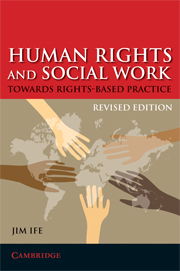Book contents
- Frontmatter
- Contents
- About the author
- Acknowledgments
- Introduction
- 1 Human Rights in a Globalised World
- 2 Human Rights: Beyond Traditional Formulations
- 3 Public and Private Human Rights
- 4 Culture and Human Rights
- 5 Human Rights and Human Needs
- 6 Human Rights and Obligations
- 7 Ethics and Human Rights
- 8 Participation in the Human Rights Discourse
- 9 Constructing Human Rights for Social Work Practice
- 10 Achieving Human Rights through Social Work Practice
- 11 Respecting Human Rights in Social Work Practice
- 12 Conclusion: Prospects for Human Rights Practice
- Appendix I The Universal Declaration of Human Rights
- Appendix II Other Human Rights Declarations, Treaties and Conventions
- References
- Index
11 - Respecting Human Rights in Social Work Practice
- Frontmatter
- Contents
- About the author
- Acknowledgments
- Introduction
- 1 Human Rights in a Globalised World
- 2 Human Rights: Beyond Traditional Formulations
- 3 Public and Private Human Rights
- 4 Culture and Human Rights
- 5 Human Rights and Human Needs
- 6 Human Rights and Obligations
- 7 Ethics and Human Rights
- 8 Participation in the Human Rights Discourse
- 9 Constructing Human Rights for Social Work Practice
- 10 Achieving Human Rights through Social Work Practice
- 11 Respecting Human Rights in Social Work Practice
- 12 Conclusion: Prospects for Human Rights Practice
- Appendix I The Universal Declaration of Human Rights
- Appendix II Other Human Rights Declarations, Treaties and Conventions
- References
- Index
Summary
The previous chapter dealt with ways to realise and protect human rights through social work practice. This chapter, by contrast, focuses on social work practice itself – it is the processes, rather than the outcomes, of social work practice that are of concern here. If social work is a human rights profession and aims to meet human rights through its practice, it is essential that the profession itself operate in such a way that its own practices observe human rights principles and do not violate the human rights of others. As in the previous chapter, many of the principles identified here have already emerged from previous discussion, for example in Chapter 7, concerning ethics and human rights, though that chapter did not undertake an examination of social work practice per se from a human rights perspective. The important principle throughout this chapter is that we respect other people's human rights by allowing them maximum self-determination and control over the situation in which they find themselves. This principle can be applied to the practice of social work. While social workers have always been committed to the principle of client self-determination, this has often applied to the life of the client rather than to the practice of social work itself and to the way social work practice is constructed by social workers.
- Type
- Chapter
- Information
- Human Rights and Social WorkTowards Rights-Based Practice, pp. 188 - 223Publisher: Cambridge University PressPrint publication year: 2008



